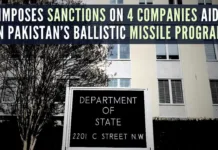
China tryst with Interpol
China exerts a large influence on Interpol. It has long been accused of abusing Interpol’s Red Notice System (RNS), which basically arrests individuals pending an extradition agreement.
For the first time, data has emerged on how China misuses Interpol tools such as Red Notices and how its use of the Interpol has changed dramatically since President XI Jinping launched his “anti-corruption” campaign, according to a report.
Although very little data on China’s use of Interpol is available, all evidence points to a significant increase in the use of its tools since Xi Jinping assumed his role at the helm of the Chinese Communist Party in 2012.
Interpol is a watchdog meant to uphold the values of fairness, transparency, and accountability and the international community must ensure that.
Questions have been raised about the neutrality of international organizations which have an increasing Chinese presence, particularly Interpol. China watchers say the way the country has been trying to exercise its clout in the Interpol is reflective of a trend wherein financial leverage is combined with diplomatic manoeuvring to build strong connections. Nominees are appointed at crucial multilateral forums to promote vested political interests.
The report by Safeguard Defenders says that after a brief period of high profile and public use of Red Notices, China’s use is now shrouded in more secrecy. Beijing has affirmed its new intended and announced policy to refrain from making its Red Notice requests public.
The use of Interpol plays a key role among other legal and extra-legal means to hunt “fugitives” in the wider ambit of his domestic “anti-corruption” campaign and international operations Sky Net and Fox Hunt.
However, rather than applying this system objectively to nab criminals and members of international gangs, China has selectively used this service to repatriate Chinese nationals wanted by the authorities for engaging in political/ religious activism or expressing views contrary to that professed by the Chinese Communist Party.
“China has kept up its great efforts in fighting corruption in recent years. Sky Net, built-in 2015 to net corrupt fugitives living overseas, has seen 4,997 fugitives returned to China from over 120 countries and regions. Among them, 54 were on the list of China’s hundred most-wanted suspects, all of whom had Interpol Red Notices for them.
The investigation highlights some of the main issues with, and the misuse of, the Interpol system by China: prolonged detention and arbitrary arrest on the basis of Red Notices of activists and persecuted ethnic or religious minorities abroad; harassment and intimidation of political dissidents; improper use of Interpol notices to induce “fugitives” to return “voluntarily”; and the wider intimidation and harassment of communities within China, Safeguard Defenders said.
The increasing extra-territorial application of National Security Provisions both in Hong Kong and on the mainland is an added cause for concern and warrants immediate attention by Interpol member states. Most recently, an official stated earlier this month that being in favour of Taiwan independence constitutes a crime and that its culprits, including those living outside the Mainland, will be criminally liable for life in China, the report said.
Despite some recent reforms, Interpol’s famously non-transparent Red Notices and Diffusions systems continue to draw harsh criticism from human rights defenders.
In the ambit of a wider campaign on issues – including bilateral extradition treaties and judicial cooperation agreements with China – the investigation seeks to elucidate some of the most obvious China abuses of the Interpol system.
[With Inputs from IANS]
PGurus is now on Telegram. Click here to join our channel and stay updated with all the latest news and views
For all the latest updates, download PGurus App.










